|
|
|
Sort Order |
|
|
|
Items / Page
|
|
|
|
|
|
|
| Srl | Item |
| 1 |
ID:
108797


|
|
|
|
|
| Publication |
2011.
|
| Summary/Abstract |
This article examines the differing meanings of volunteering that underlie the management of volunteers in diverse cultural contexts by analyzing a case study of an Australian non-government organization (NGO) working in Papua New Guinea (PNG), where local volunteers are engaged in a number of its programs. The results indicate that gift-exchange theory may be a fundamental influence shaping attitudes towards volunteering by PNG nationals. This has led to the development of a gift-exchange model to assist other Western-based NGOs to manage formal volunteering in Pacific nations in a way that is both effective and culturally appropriate.
|
|
|
|
|
|
|
|
|
|
|
|
|
|
|
|
| 2 |
ID:
183460
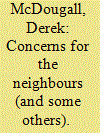

|
|
|
|
|
| Summary/Abstract |
Focusing on the conflicts in the Southern Philippines and West Papua, this article uses a framework developed from the literature on the internationalisation of ethnic conflict to suggest insights into international involvement in both conflicts. In both cases there are succinct overviews of the relevant general background to the conflict, and international involvement in particular, followed by a characterisation in terms of typological features that covers motives for involvement, objectives, means of involvement, and impact. Insights into international involvement in the two conflicts can suggest ways in which aspects of the general literature might be developed further, but two cases are insufficient to develop more broad ranging generalisations. A key insight is the way in which specifically political factors can affect the way in which motives for involvement manifest themselves, the significance of Sabah politics in relation to Malaysian involvement in the Southern Philippines, and West Papuan lobbying in the Melanesian countries being cases in point.
|
|
|
|
|
|
|
|
|
|
|
|
|
|
|
|
| 3 |
ID:
169136


|
|
|
|
|
| Summary/Abstract |
It appears that an almost unquestioned development pathway for achieving gender equity and women's empowerment has taken centre stage in mainstream development. This pathway focuses on economic outcomes that are assumed to be achieved by increasing women's access to material things, including cash income, loans, physical assets, and to markets. Gender equity indicators, which measure progress towards these outcomes, cannot escape reinforcing them. We argue that far from being neutral, indicators are embedded in political and ideological agendas that serve as guides to the appropriate conduct of those whose performance or behaviour is being measured. Drawing on participatory feminist, diverse economies and strengths based approaches, we outline a research methodology for developing community‐based indicators that recognises women's and men's participation and relationships in all spheres of life, including the ‘non‐economic’. If indicators are grounded in local meanings and realities, we propose that community members can use them to identify aspirational goals for gender equity, and measure progress towards these goals.
|
|
|
|
|
|
|
|
|
|
|
|
|
|
|
|
| 4 |
ID:
073364


|
|
|
|
|
| Publication |
2006.
|
| Summary/Abstract |
In April 2006, rioting broke out in Honiara, Solomon Islands, following the parliamentary election of Snyder Rini. Occurring almost three years after the commencement of the Australian-led Regional Assistance Mission to Solomon Islands (RAMSI), the riots sparked intense deliberations about the nature of Australia's engagement with Solomon Islands and the success, or otherwise, of RAMSI. Within the context of discussions about state-building in Melanesia, this article seeks to outline challenges to the success of RAMSI. Ultimately, we argue that successful state-building in Melanesia is highly dependent upon awareness of local conditions, rather than simply the application of international best practice. Moreover, we suggest that unless the current approach is modified to accommodate local circumstances-including social and political structures and locally defined needs and desires-the existing growth of anti-RAMSI sentiment will continue to escalate. In conclusion, we offer policy-relevant suggestions aimed at assisting mission stakeholders to improve RAMSI's viability and impact.
|
|
|
|
|
|
|
|
|
|
|
|
|
|
|
|
| 5 |
ID:
117142
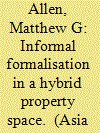

|
|
|
|
|
| Publication |
2012.
|
| Summary/Abstract |
Across post-colonial Melanesia, the benefits and costs of 'mobilisation' of customary land for economic development remain much debated among scholars, activists, policy-makers and the donor community. This paper presents a case study from Solomon Islands of a hybrid property space in which smallholder oil palm blocks are being established on customary land through an informal 'smallholder land use approval' system. This system provides salutary evidence of how customary land can be engaged for commercial agricultural activity without recourse to formalisation. It also potentially provides a more equitable pathway for landowners, especially women and young men, to engage in the oil palm sector, with the only current alternative being the registration and leasing of land directly to the oil palm company. However, enthusiasm for the scheme must be tempered by an explicit awareness of the relationships between land, development and conflict on the island Guadalcanal where the oil palm operation is located. The nascent 'informal formalisation' and commercialisation of customary land that is taking place on Guadalcanal is subjected to a conflict analysis informed by both the recent history of violent conflict in the area and comparative experience from the village oil palm sector in neighbouring Papua New Guinea. A number of potential conflict stresses are identified and recommendations made to mitigate them.
|
|
|
|
|
|
|
|
|
|
|
|
|
|
|
|
| 6 |
ID:
185112
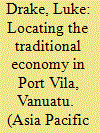

|
|
|
|
|
| Summary/Abstract |
Alternative economic indicators are becoming policy in Vanuatu, particularly focusing on what national policy calls traditional economy. Although this acknowledges livelihoods and customary land in rural areas, urban places receive less attention. This article advances an argument that cities are also home to traditional economies. We draw on concepts of diverse economies and translocality to examine how economic practices typically associated with community activities on customary land are also found in cities where households lack direct access to customary resources. Empirical data come from the authors' fieldwork and participation in community-based organisations in Port Vila, Vanuatu, from 2017 to 2020. The case study presents surveys of agrobiodiversity in 27 urban backyards and livelihood practices of 24 households; and accounts of co-authors' participation in community-based disaster to distribute disaster relief supplies from urban to rural, create urban markets for rural crops and build urban resilience following Ambae Island's Manaro volcano eruptions and COVID-19-related unemployment. This study demonstrates how traditional economies are part of everyday urban life.
|
|
|
|
|
|
|
|
|
|
|
|
|
|
|
|
| 7 |
ID:
039406


|
|
|
|
|
| Publication |
London, Methuen and co. ltd., 1971.
|
| Description |
lx, 464p.:table,fig.Hbk
|
| Standard Number |
416171206
|
|
|
|
|
|
|
|
|
|
|
|
Copies: C:1/I:0,R:0,Q:0
Circulation
| Accession# | Call# | Current Location | Status | Policy | Location |
| 007340 | 915.0995/BRO 007340 | Main | On Shelf | General | |
|
|
|
|
| 8 |
ID:
083217


|
|
|
|
|
| Publication |
2008.
|
| Summary/Abstract |
The hype about the potential for terrorism in Melanesia due to the region's weak and failing states has obscured some of the less newsworthy but equally important developments. One of these is the slow but steady growth in the popularity of Islam in Melanesia. This article reviews the limited literature on terrorism in the Pacific. It provides a brief historical overview of the growth of Islam in Melanesia on a country-by-country basis, and draws on a comparative case study and theories of culture and public goods to explore possible reasons for Islam's appeal. It argues that although Islam is likely to continue to grow, its growth is neither a necessary or sufficient basis for declaring terrorist threats to exist. The article emphasises the need to analyse the broader social factors behind Islam's growth as a basis for understanding the conditions through which potential threats to regional security might develop
|
|
|
|
|
|
|
|
|
|
|
|
|
|
|
|
| 9 |
ID:
165122
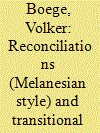

|
|
|
|
|
| Summary/Abstract |
This article examines kastom reconciliations as practiced in a Melanesian cultural context in the resolution of everyday disputes and as a means of peacebuilding after large-scale violent conflict. It explores Melanesian-style reconciliation in relation to the conventional international discourse on transitional justice, asking whether kastom reconciliations are – or can be – an alternative to, or a specific ‘vernacularised’ form of, transitional justice. Using examples primarily from post-conflict Bougainville and Solomon Islands, the article addresses some of the strengths and limitations of kastom reconciliation in comparison to those of transitional justice. In conclusion it is posited that protagonists of transitional justice could gain insights from the study of Melanesian reconciliations that would help them to reflect on their own taken-for-granted assumptions and consider avenues for developing the concept of transitional justice, making it more meaningful, effective and legitimate in a context such as Melanesia.
|
|
|
|
|
|
|
|
|
|
|
|
|
|
|
|
| 10 |
ID:
146527
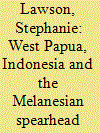

|
|
|
|
|
| Summary/Abstract |
The idea of a shared Melanesian identity has been consolidated over the last three decades or so through the most important subregional organisation in the South-West Pacific—the Melanesian Spearhead Group (MSG). The solidarity of this group has been strained over various issues from time to time, but none is as fraught as the Indonesian occupation of what is commonly known as West Papua, whose indigenous Papuan people are ethnically Melanesian. In addition to recounting the Indonesian takeover of West Papua in the context of the dynamics of decolonisation, the Cold War and early regional development, the article examines the emergence of Melanesian identity and the MSG, before considering more recent developments. These focus on a recent bid by West Papuans for MSG membership, key aspects of Indonesia's role in the Melanesian subregion, and the extent to which these developments highlight competing logics in regional and international politics.
|
|
|
|
|
|
|
|
|
|
|
|
|
|
|
|
|
|
|
|
|